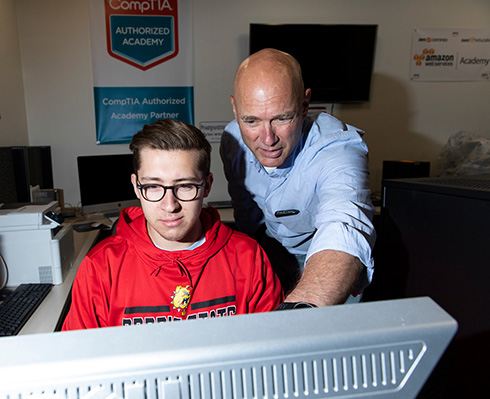
A 15-month schedule is underway to develop Ferris State University’s $29.5 million Center for Virtual Learning on the Big Rapids campus. The future facility, planned for the site of the former Vandercook Hall, will be home to Information Security and Intelligence, the School of Digital Media, School of Education, eLearning and the new Artificial Intelligence program.
The state of Michigan will contribute $22 million for the Center for Virtual Learning’s construction as a capital outlay project. In December 2020, Gov. Gretchen Whitmer signed the Public Act awarding the funds, and Ferris’ Board of Trustees approved construction plans at its Feb. 19 meeting. At that same meeting, the trustees approved a Bachelor of Science in Artificial Intelligence. According to a LinkedIn report, job growth in this career field heads the top 15 emerging jobs list.
Faculty members involved in the Center for Virtual Learning’s development see the project’s collaborative nature as benefiting future student learning.
“Program founder and coordinator Greg Gogolin has been our lead contact for design considerations in the Center for Virtual Learning,” Associate Professor Jerry Emerick said. “The Information Security and Intelligence and Artificial Intelligence faculty have sat in on meetings and offered input. Greg’s participation has been ongoing for more than four years.”
The facility will have state-of-the-art features to offer expanded teaching and learning opportunities.
“One of the primary elements the Center for Virtual Learning will offer us is a Faraday Lab, which will allow us to isolate all network communication,” Gogolin said. “The design considerations we have offered will help facilitate AI instruction and research with several instructional delivery technologies that will provide the adaptive capability.”
Emerick and Assistant Professor Molly Cooper agree that the year ahead promises to be active as Ferris begins its Artificial Intelligence instruction. That effort includes informing the larger educational community that this next-level learning is now available through this new College of Business program.
“I anticipate interest in the new Artificial Intelligence degree will grow rapidly during this first year of instruction,” Emerick said. “We see a significant potential to help fill a growing demand in the job market for people skilled in machine learning and AI.”
Cooper agrees.
“Cybersecurity is a high-priority element for any industry’s leadership team,” she said. “Our AI students will find that healthcare companies and insurance firms are only some fields that are utilizing AI to improve their competitive advantage. We will be excited to help the Admissions staff promote this important new program and the Center for Virtual Learning, which will be its home.”
Faculty started offering Artificial Intelligence instruction during Summer 2021. By late 2022, AI and Information Security and Intelligence expect to move to the Center for Virtual Learning.
ISI course development has more than a decade of following a vision to provide Ferris students opportunities to become global digital forensics, data analytics, and global cybersecurity leaders. The National Security Agency, U.S. Department of Defense and the Accreditation Board for Engineering and Technology have credentialed Ferris’ Information Security and Intelligence program.
Cooper and Emerick look forward to a collaborative experience getting started. A biometrics course was the first approved by the Academic Senate for the Bachelor of Science in Artificial Intelligence. Cooper and Emerick are teaming to teach Ferris’ first class with AI instruction this summer. This effort follows months of work gaining certification, completing research and developing course content.
“We have been collaborating on this course which is a special topic presentation within the Information Security and Intelligence curriculum,” Emerick said. “A great deal of work has gone into reaching this point of instruction, and we are excited to engage with our students this summer as we launch our first Artificial Intelligence course.”
Cooper added that Room 102 in the College of Business building was modified as a laboratory to facilitate AI instruction during the Center for Virtual Learning’s construction.
“We had assistance from a couple of top Information Security and Intelligence students in the arrangement of technology in that laboratory space,” Cooper said. “It will be a very good facility to begin instruction in

Artificial Intelligence, but we look forward to the Center for Virtual Learning and the computing power that building will offer for this curriculum.”
Excitement is building for the future of Ferris’ Artificial Intelligence program.
“We are eager to launch the new AI degree, even given new challenges faced because of the COVID-19 pandemic,” Emerick said. “We believe we have fascinating, relevant, and valuable material to offer our students.”
Added Cooper, “Machine learning, the implications that artificial intelligence has for areas like social media, communications technology and other sectors will have a place in our curriculum. We see this as next-level learning, so to be adept as instructors, faculty members have accepted the challenge to immerse ourselves in research and reach out to industry, then turn over what we have found to our students.”


